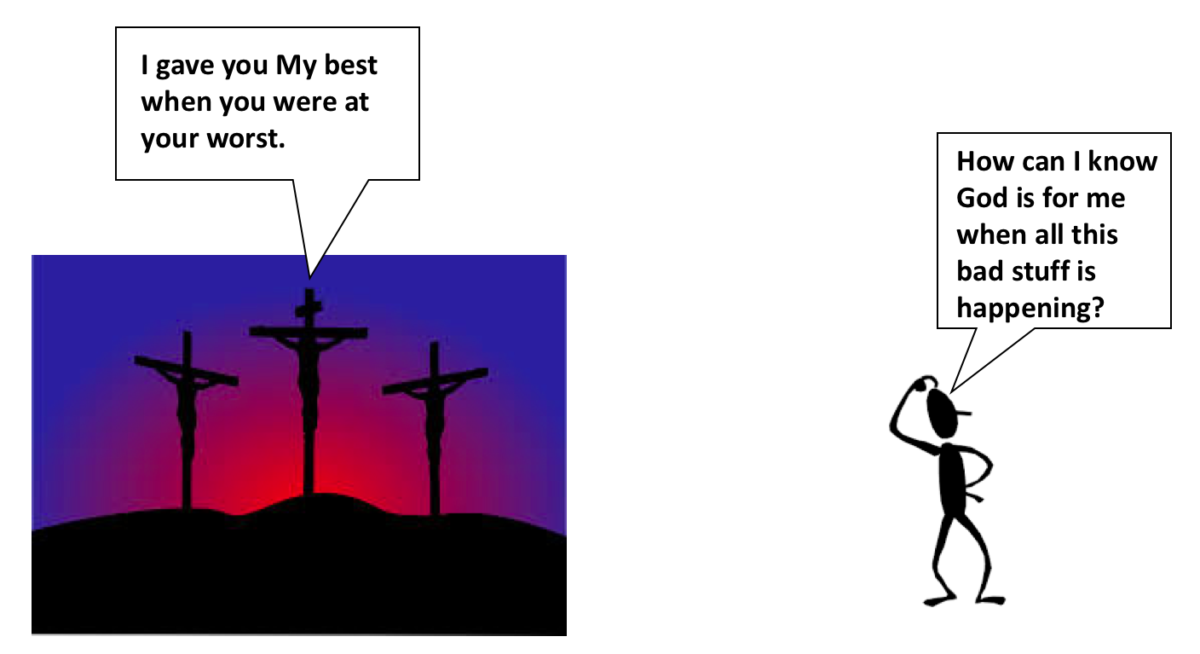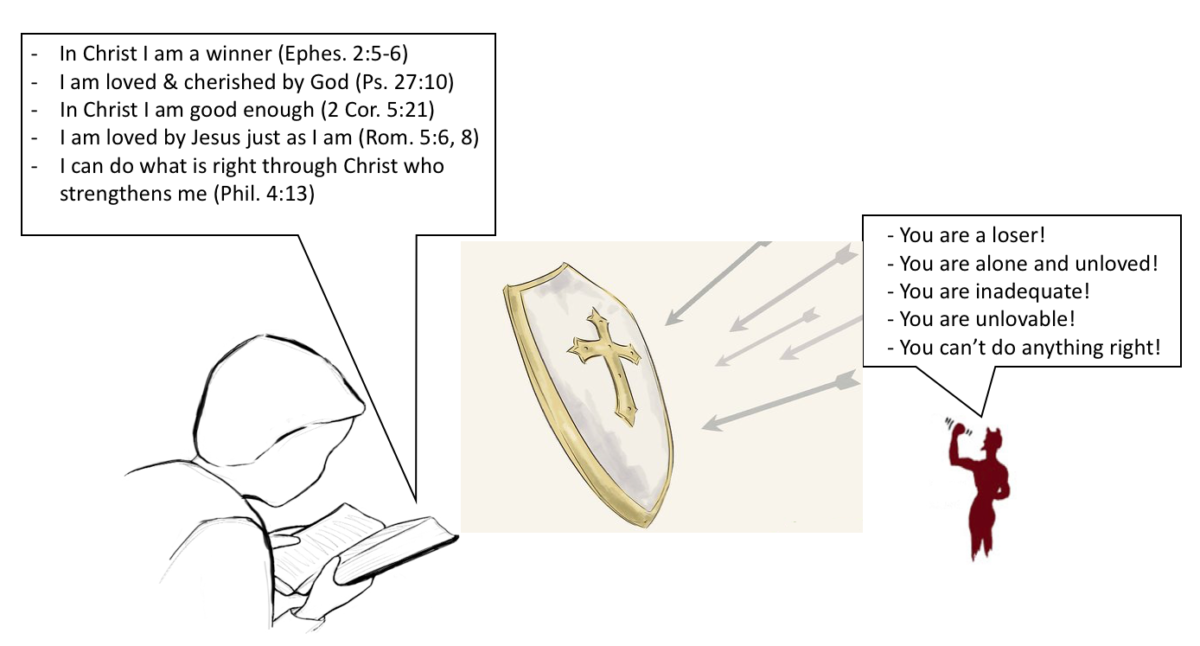“And the Word became flesh and dwelt among us, and we beheld His glory, the glory as of the only begotten of the Father, full of grace and truth.” John 1:14
In the first five verses of John we saw that the Word, Jesus Christ, is eternal, relational, and our Creator God (John 1:1-3). Jesus is the only source of eternal life and hope (John 1:4-5). So when we look at Jesus, we are looking at our Creator God in human flesh. Jesus Christ made you and me to have a relationship with Him. So what is God like?
In John 1:14, we are going to see that God became a man in order to show us what He is like (John 1:18). The apostle John writes, “And the Word became flesh…” (John 1:14a). The most amazing fact of history is that the Word, God Himself, became a human being without ceasing to be God. Religions seek to know how we as humans can get to God. Yet the Bible tells us that God came to us. The Word, Jesus Christ, became a human being.
The word “dwelt” (skēnóō) means “to
tabernacle” (John 1:14). Just as God’s presence dwelt among the Israelites
in the tabernacle (cf. Exodus 25:8-9; 33:7, 11), so He lived among people in
the Person of Jesus Christ. King Solomon thought it incredible that God would dwell on the earth (1 Kings
8:27), but that is precisely what He did in Jesus.
Why did God become a man? So, we could approach Him and trust
Him. For example, a construction company was once building a road through some
mountainous country, using dynamite to build a roadbed. Steve, who worked for
the company, was placing the dynamite charges. One day as he was getting ready
to detonate a charge, he noticed that several little chipmunks had come out
of the underbrush, playing around the hole where he had installed the
explosives. Steve, being a tenderhearted guy, didn’t want to see those little
chipmunks blown to bits, so he began trying to drive the chipmunks away. Each
time however, they just came right back to the location. His supervisor,
Charlie, came out to see what was holding up the blasting. Steve, exasperated,
explained that those chipmunks would not get out of the danger area. Charlie
chuckled, and then used the incident to talk about Jesus Christ.
He explained
to Steve that the only way one of them could communicate with those
chipmunks, was if one of them became a chipmunk, and yet at the same time,
kept all the characteristics of a man. Chipmunks are afraid of humans because
we are twenty times their size. But if you become a chipmunk, they would be
able to trust you and relate to you, because you would be able communicate the
great danger caused by the dynamite (from Eight Vital Relationships for the
Growing Christian (Dallas: EvanTell, Inc., 1982), Chapter 2, p. 6).
This is
exactly what God had to do – He became a man in order to communicate with
the human race what God is really like and to warn them of the incredible
danger facing them if they rejected Christ (Matthew 23:14; 25:41, 46a; Mark 9:42-47;
12:40; Luke 20:47; John 1:1, 14-18; 3:18, 36; Revelation 20:15). If God came to
us in the fullness of His glory, we would be too frightened of Him to trust Him
(cf. Exodus 33:20; Ezekiel 1:28; Revelation 1:17) just like a chipmunk would be
too scared to trust us.
The reason John could say he and the other disciples “beheld His glory, the glory as of the only begotten of the Father” (John 1:14b) without overwhelming fear was because Jesus’ humanity veiled (Philippians 2:5-8; Hebrews 10:20) the fullness of the glory He possesses in heaven (cf. Revelation 1:12-18).
Jesus became a human being so that you and I could relate to Him and Him
to us. Therefore, we are to trust Him at all times because He understands us. Hebrews
4:15-16 says of Jesus, “Since we do not have a High Priest who cannot
sympathize with our weaknesses, but was in all points tempted as we are yet
without sin; Therefore, let us boldly come to the throne of grace.” He
voluntarily became one of us so that you and I would believe that our Savior
knows how we feel.
Perhaps you have viewed God as some distant impersonal force who
does not care about you or your circumstances. You may say to yourself, “How
could God let COVID-19 happen? I have lost my income, my health, and my friends!
What kind of God is this?” Please understand that the God of the Bible is
not some distant dictator who delights in punishing people.
Listen to what
Christian author Max Lucado says, “From the funeral to the factory to the
frustration of a demanding schedule, Jesus Christ understands [bold lettering
is mine]. When you tell God that you’ve reached your limit, He knows what you
mean. When you shake your head at impossible deadlines, He shakes his, too.
When your plans are interrupted by people who have other plans, He nods in
empathy. He has been there. He knows how you feel. … Rejection? He felt it.
Temptation? He knew it. Loneliness? He experienced it. Death? He tasted it. And
stress? He could write a best-selling book about it. Why did He do it? One
reason. So that when you hurt, you will go to Him… and let Him heal you” (Max
Lucado, In the Eye of the Storm: A Day in
the Life of Jesus, (Nashville: Thomas Nelson, Inc., 1991), pp. 16-18).
The glory of Jesus that the disciples beheld was “full of grace
and truth” (John 1:14c). Christ maintained a perfect balance between these
two attributes. Of all the phrases that God could have used to describe Jesus
Christ, He chose “grace and truth.” “Grace” refers to the unmerited
kindness of God or getting what we do not deserve. We do not deserve eternal
life, forgiveness, or salvation from hell, but Jesus Christ can freely offer
this to us apart from any of our works because of His “grace” (John
4:10-14; Romans 3:24; 4:4-5; 6:23b; 11:6; Ephesians 2:8-9).
“Truth” refers to the perfect standard of God’s
holiness. Truth says there is a right way, a best way. In life, some things
are true which makes other things false. We do reap what we sow. There are
consequences to our actions. Truth is true. It is unbendable and unbreakable
and unyielding. Jesus came full of truth. Every word that He spoke was
truth. Christ never told a lie. Every action and every thought were true. When
Satan came against Jesus tempting Him by perverting the Word of God just a
little (Matthew 4:1-11), how did Jesus respond? “It is written in God’s
Word. Here’s the truth.” He always countered falsehood with truth. Near the
end of His life before Pilate, Jesus said, “Everyone who is of the truth
hears My voice” (John 18:37). Pilate said to Him, “What is
truth” (John 18:37-38)? Then Pilate walked away. That was a big mistake,
because the One who is “the way, the truth, and the life” (John 14:6)
was right in front of him. The One who is and knows all truth is there. So,
truth must be included in grace or grace is merely tolerance.
Truth without
grace is just as destructive as grace without truth. Truth without grace is unbearable. Only the
arrogant, proud hypocrite thinks all he needs is truth, because he thinks he
has it all together. In the Sermon on the Mount in Matthew 5-7, Jesus outlines
the perfect life. In the middle of that sermon Jesus says, “Therefore you
shall be perfect, just as your Father in heaven is perfect” (Matthew 5:48). Jesus means what He says here. When I read
the expectations of God on my life and I hear His call to be perfect, I say, “Lord
I can’t do it. Have mercy on me a sinner, because I fall way too short. The bar
is too high.” That’s the demand of truth all by itself and it overwhelms
us. God says, “I didn’t just come in truth, I came in grace.”
Why is grace and truth so important? As humans, we tend to err on one side or the other of
grace and truth. Grace without truth is wishy washy. It is a farce. It is
called tolerance. There are no absolutes… no right or wrong… no consequences
for our actions. Anything goes, resulting in lives without direction. There is
nothing we can know for sure which is tolerance. For grace to be real, it
must be based on truth.
For example, grace without truth is like
taking your car to the body shop to get rid of the rust. You get the car back
and it looks great. But a year later the rust appears again. The mechanic
didn’t remove the rust, he just covered it up to make it look good. Eventually,
the rust keeps coming back. That’s how it is when you try to ignore truth.
You can ignore truth for a while, but it keeps coming back. I can ignore
the law of gravity and step off a cliff – and the law of gravity still applies
to me. It doesn’t matter what you believe in that case. If you ignore it, it
bites you.
Do you remember the woman in John 8? The religious leaders
were ready to stone her because the law (the truth) said you should (cf. Leviticus
20:10). She was caught in the act of adultery and they came to Jesus saying, “The law says she should die. What do you
say, Jesus?” For a few moments, Jesus wrote on the ground, while they
pestered Jesus. Then Jesus stood up and looked them in the eye and said, “He who is without sin among you, let him
throw a stone at her first” (John 8:7).One by one, starting with the oldest, they all walked away. Jesus
kept writing on the ground.
After a while
there was no one left except Jesus and the woman. Jesus looked up at her and
said, “Woman, where are those
accusers of yours? Has no one condemned you?” (John 8:10). She said, “No one, Lord” (John 8:11a). Here’s the thing. On that day,
there was somebody there who could condemn her…who could have thrown the first
stone… there was someone who was sinless – Jesus (cf. John 18:38b; 2
Corinthians 5:21; Hebrews 4:15; I Peter 3:18). He could have done it. Instead Christ
said to her, “Neither do I condemn you. Go and sin no more” (John 8:11b). That is grace and
truth.
Truth expresses God’s righteous character and demands punishment for all
of our sins (Romans 3:9-23). Jesus Christ was a perfect display of
God’s truth. He is “the truth” (John 14:6). He was perfect and sinless (cf.
2 Corinthians 5:21; Hebrews 4:15; I Peter 3:18). Even the political leaders
could “find no fault in Him at all” (John 18:38; cf. Luke 23:4,
14-15, 22; John 19:4, 6). God’s judgment of sin fell on Jesus instead of us when
He died on the cross in our place (Isaiah
53:5-6; Matthew 27:45-56; Romans 5:8; I Corinthians 15:3; 2 Corinthians 5:21; I
Peter 3:18). That is truth.
But grace is
seen while Jesus was hanging on the cross. After His enemies physically and verbally
abused Him, and nailed Him to a cross, Jesus prayed, “Father, forgive them,
for they do not know what they do” (Luke 23:34). Did they deserve Christ’s
forgiveness. No, none of us do. But grace offers forgiveness freely. Jesus also
said to the thief hanging next to Him, “Today you will be with Me in Paradise”
(Luke 23:43). Without grace, the thief on that cross dies in his sin and
goes to hell.
Christ is full of grace and truth. He has the perfect ability to tell us
the awful truth about ourselves, while holding us up by His grace. Because He
is full of truth He was the perfect sacrifice to pay the penalty for our sin
(2 Corinthians 5:21; I Peter 3:18). Because He is full of grace, you can
come to Him just as you are, without having to clean up your life first.
And because He is full of truth, you can come in complete confidence knowing
that He will keep His promise to forgive you and grant you eternal life the
moment you believe in Him. Jesus promised, “He who believes in Me has
everlasting life” (John 6:47).
That’s grace
and that’s truth. Jesus was full of both. Therefore, we are to seek to be
gracious and truthful with one another (Ephesians 4:15). We are called to
forgive others as Christ has forgiven us (Ephesians 4:32; Colossians 3:13). Is
there someone in your life that needs not just truth, but grace? Something has
come between you and your relationship? They need to hear from you that the
past is gone. It’s been wiped out. That’s the power of grace.
Prayer: Lord Jesus, You are totally amazing! You are the perfect balance of grace
and truth. Thank You for telling me the truth about myself. I have sinned
against You with my thoughts, words, and actions which makes me deserving of
eternal separation from You in the lake of fire. But Your grace led You to take
my punishment when You died in my place on the cross and rose from the dead.
Because You are the truth without any sin, Your perfect sacrifice for my sins
satisfied God’s holy demand to punish all my sins. Your grace invites me to
come to You just as I am to freely receive Your forgiveness and everlasting
life by believing in You. I can know with confidence that I have everlasting
life the moment I believe in You because as the truth, You can never lie. You
always keep Your promises. Please, my Lord and my God, change me so I can show
grace and truth to others as You have shown to me. Lead me to those who not
only need Your truth, but also need Your grace. They need to know that their
past is gone. It has been erased because of Your grace. In Jesus’ name. Amen.




